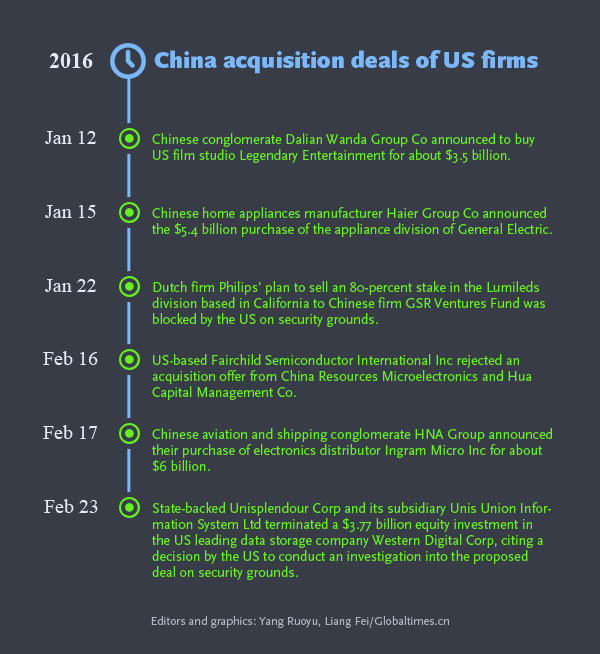US elections may ‘politicize’ Chinese M&Aswww.wanmei.com 2016-07-26

Chinese companies planning to invest in or take over US firms are expected to continue to face strong headwinds from US regulators in 2016, an election year that may politicize some transactions, experts said on Wednesday.
The requirements for Chinese investors are different from those set for investors of other countries and regions, and politics affected some Chinese investments in the US, Robert Hong Xiao, CEO of China-based online game developer Perfect World, told the Global Times on Wednesday.
"I hope that further development of Sino-US relations can clear up those obstacles," said Xiao.
China National Chemical Corporation's planned $43 billion takeover bid of Syngenta AG, a seed giant, was among the latest that suffered from broadsides from US lawmakers.
US Senator Debbie Stabenow, a ranking member of the US Senate Agriculture Committee, spearheaded the signing of a letter on March 24, calling on the US Department of the Treasury to review the Syngenta takeover for "any potential effects on US national security and the American food system."
Since 2016 is an election year, "some senators will be tough on takeover bids from China to win over voters who have been complaining about the growth of Chinese manufacturing in the US," Hao Junbo, a lawyer at Beijing-based Hao Law Firm that specializes in international lawsuits, told the Global Times Wednesday.
The risk would be more acute in some sensitive sectors such as semiconductors and telecommunications, where US authorities are concerned about the potential pressure and threats to the industry from Chinese companies, especially from State-owned ones, said Hao.
Experts said they have pinned their hopes on a meeting between Chinese President Xi Jinping and US President Barack Obama in Washington Thursday before the fourth Nuclear Security Summit.
The meeting will provide a positive impetus for Sino-US economic and trade ties, He Weiwen, co-director of the China-US-EU Study Center under the China Association of International Trade, told the Global Times Wednesday. "Their meeting will focus on the Bilateral Investment Treaty and cyber security."
Bumpy year
Chinese investments in the US semiconductors industry have been experiencing a bumpy road this year.
China's State-backed Unisplendour Corporation terminated a $3.77 billion investment in leading data storage company Western Digital in February, citing a decision by the Committee on Foreign Investments in the US (CFIUS) to investigate the proposed deal on security grounds.
Guo Jian, a semiconductor industry analyst at CCID Consulting, said that besides the US, countries such as Japan are also carefully scrutinizing mergers involving national energy and information security.
But reports are rare about Chinese merger attempts in Japan being stalled.
"Mergers are more successful in Japan than in the US partly because major shareholders of Japanese firms were eager to dump unprofitable assets," Guo told the Global Times Wednesday, "while assets of US firms are considered superior assets."
CFIUS's annual report to Congress in February said 24 out of 147 notices CFIUS reviewed in 2014 were submitted by Chinese interests, dominating the CFIUS's agenda for the third year in a row. The UK followed with 21 notices.
Covington & Burling LLP, an international law firm, predicted in a report issued on February 22 that in 2016, even non-sensitive sectors may become more politically sensitive.
However, some said the potential setbacks will not affect interest in some fields.
Perfect World, which invested $250 million in February in movies to be released by Universal Pictures, said it is confident with its investment.
He said it is relatively easier for Chinese firms to merge with US companies engaged in commercial trade, property and entertainment.
It is also easy to open up the online travel market, where mergers are loosely supervised, listed Chinese online travel company Tuniu, which was listed on NASDAQ in May 2014, told the Global Times on Wednesday.
Posted in: Markets, Companies
